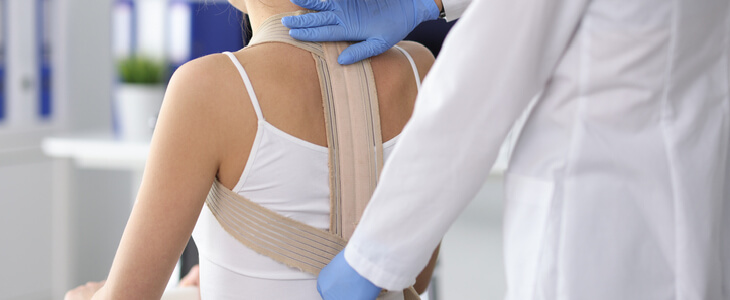Scoliosis, a sideways curvature of the spine, though most often diagnosed in early adolescence, is also a problem for adults we treat at Long Island Spine Rehabilitation Medicine. Because our practice is nonsurgical, our physiatrists offer conservative therapies that are extremely effective and minimally invasive. For victims suffering from adult scoliosis, our holistic treatments can relieve pain and restore function, even if symptoms worsen with age.
If you are one of the few adults who was not diagnosed or treated for scoliosis in childhood or adolescence or one of the many others who has developed scoliosis as an adult, our experienced doctors can treat you successfully, relieving your symptoms so that you can live a healthy, comfortable life.
Why L.I. Spine Rehabilitation Medicine Is the Place to Come for Scoliosis Treatment
Whether you are experiencing symptoms of scoliosis, have been recently diagnosed with the condition, or fear that it is an underlying problem for you, contact one of our five conveniently located offices for an appointment with one of our talented, empathic doctors.
As physiatrists, we have a pragmatic approach to medicine. Our priority, like yours, is making you feel better as quickly as possible and keeping you on track to maintain a pain-free life. We are known for using a broad range of treatments, both traditional and complementary, frequently in combination, in order to provide optimal results. Moreover, we always take your input seriously, believing that the best doctors work in tandem with their patients.
Adult-Onset (De Novo) Scoliosis
When adults develop scoliosis later in life, it is known as adult-onset (de novo) scoliosis, resulting from asymmetrical degeneration of their spinal joints and discs and affecting primarily the lumbar spine. We have a track record of success with such patients, not only in relieving their symptoms but in restoring their vitality and range of motion.
Symptoms of Adult Scoliosis
Adults with mild scoliosis may not experience pain, but the greater their spinal curvature the more likely patients are to be coping with the following symptoms:
- Back pain
- Inability to stand straight
- Height loss
- Weak core muscles
- Difficulty exercising
- Poor conditioning
- Numbness, weakness, or leg pain
- Asymmetrical alignment of hips and pelvis
If you are experiencing some combination of these symptoms, it is very likely that a customized combination of our treatments will be beneficial and perhaps even life-altering.
Diagnosing Adults With Scoliosis
Adult scoliosis, like childhood scoliosis, is diagnosed by a physical exam that not only checks for asymmetry but for muscle strength, reflexes, and range of motion. We will also take your family history and try to establish the age at which you first noticed alterations to your spine, and inquire about the location and type of your back pain. X-rays and other imaging tests (e.g. MRI or CT scan) may be required as well. We may also use electromyography (EMG) studies to assess the health of your muscle and nerve cells.
Treatments Our Spinal Specialists Offer for Adult Scoliosis
We have found that one or more of the following therapies can provide meaningful relief from the symptoms of degenerative scoliosis:
- Personalized physical therapy
- Epidural steroid injections under fluoroscopic guidance
- Radiofrequency ablation
- Nerve block injections
- Acupuncture
- Pulsed electromagnetic field (PEMF) therapy
The braces that are helpful in correcting scoliosis in childhood scoliosis will no longer work for this purpose in adults since adult bones stop growing and are no longer malleable. Nonetheless, such braces may provide pain relief by offering adult scoliosis patients external support.
Along with the treatments listed above, our physiatrists find that making healthy lifestyle changes can diminish scoliosis symptoms and improve our patients’ quality of life. We recommend that patients with adult scoliosis:
- Maintain an appropriate weight
- Engage in regular exercise (especially stretching, core-
strengthening exercises, and low-impact sports like swimming)
- Give up smoking
- Use NSAIDs to relieve pain and inflammation
Is Surgery Ever Used for Adult Scoliosis?
Surgical correction is rarely used for adult scoliosis because of the risks involved in the procedure and the fact that such surgery requires a lengthy recovery. It should only be considered as a last resort in cases of extreme deformity, dysfunction, or unrelieved pain.
Contact Our Experienced Scoliosis Doctors to Discuss Your Best Options
In the vast majority of cases, adult scoliosis can be successfully treated with conservative, holistic methods. Our doctors, who are compassionate people as well as outstanding professionals, are here to provide it. Contact Long Island Spine Rehabilitation Medicine today so we can determine whether you have scoliosis and, if so, begin treating it in the most gentle, effective way possible.
